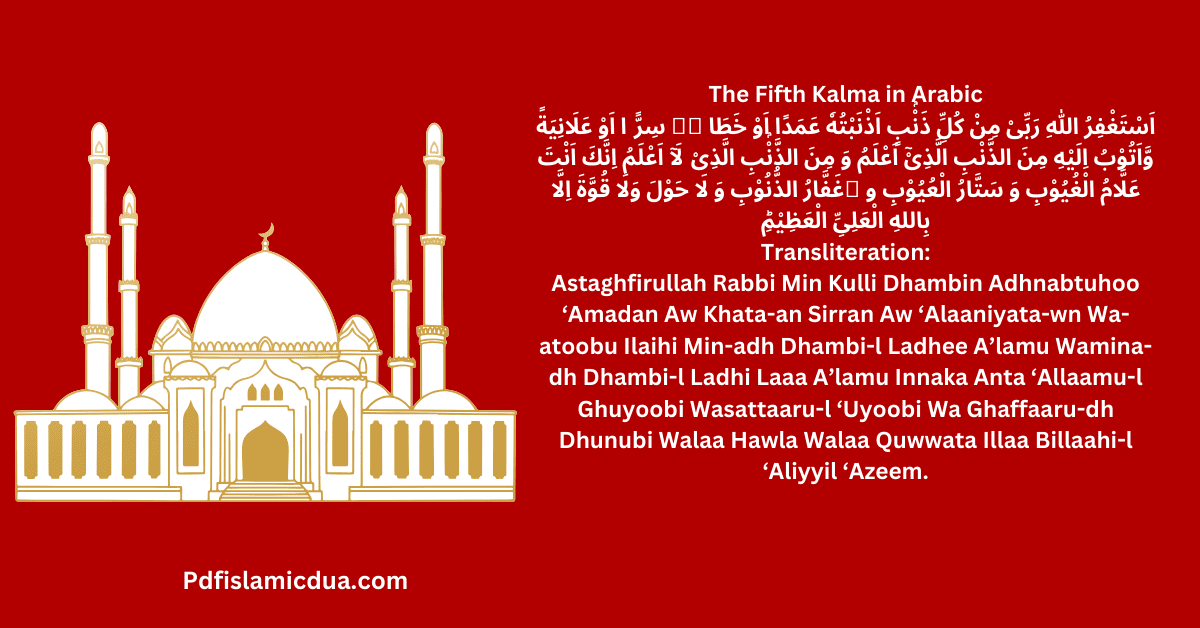Blog
5 kalima, 5 kalima full, 5 kalma astaghfar meaning in urdu, 5th kalima, 5th kalima istighfar, 5th kalma, 5th kalma astaghfar, 6 kalimas in arabic, astaghfar kalma in hindi, fifth kalima, fifth kalima astaghfar, fifth kalma, fifth kalma astaghfar, fifth kalma full, fifth kalma full hd text, kalima astaghfar in arabic, kalma astaghfar, kalma astaghfar in arabic, kalma astaghfar in english, kalma fifth, panchwa kalma astaghfar, panjam kalma astaghfar
pdfislamicdua
0 Comments
Fifth Kalma (Kalima Astaghfar) in Arabic, Meaning and Benefits
The Fifth Kalma, also known as Kalima Astaghfar, is a powerful declaration of repentance in Islam, focusing on seeking forgiveness from Allah for sins committed knowingly or unknowingly, both in private and public.
The Fifth Kalma in Arabic
اَسْتَغْفِرُ اللهِ رَبِّىْ مِنْ كُلِِّ ذَنْۢبٍ اَذْنَبْتُهٗ عَمَدًا اَوْ خَطَا ًٔ سِرًّا اَوْ عَلَانِيَةً وَّاَتُوْبُ اِلَيْهِ مِنَ الذَّنْۢبِ الَّذِیْٓ اَعْلَمُ وَ مِنَ الذَّنْۢبِ الَّذِىْ لَآ اَعْلَمُ اِنَّكَ اَنْتَ عَلَّامُ الْغُيُوْبِ وَ سَتَّارُ الْعُيُوْبِ و َغَفَّارُ الذُّنُوْبِ وَ لَا حَوْلَ وَلَا قُوَّةَ اِلَّا بِاللهِ الْعَلِىِِّ الْعَظِيْمِؕ
Transliteration:
Astaghfirullah Rabbi Min Kulli Dhambin Adhnabtuhoo ‘Amadan Aw Khata-an Sirran Aw ‘Alaaniyata-wn Wa-atoobu Ilaihi Min-adh Dhambi-l Ladhee A’lamu Wamina-dh Dhambi-l Ladhi Laaa A’lamu Innaka Anta ‘Allaamu-l Ghuyoobi Wasattaaru-l ‘Uyoobi Wa Ghaffaaru-dh Dhunubi Walaa Hawla Walaa Quwwata Illaa Billaahi-l ‘Aliyyil ‘Azeem.
Meaning in English:
“I seek forgiveness from Allah, my Lord, for every sin I have committed, knowingly or unknowingly, secretly or openly. I turn to Him in repentance from the sins I am aware of and the sins I am not aware of. Truly, You are the Knower of the unseen, the Concealer of faults, and the Forgiver of sins. There is no power and no strength except with Allah, the Most High, the Most Great.”
What is Astaghfar?
Astaghfar (استغفار) means “seeking forgiveness” or “apology for sins and faults.” The Fifth Kalima, known as Kalima Astaghfar, signifies a believer’s act of asking Allah for forgiveness for sins, whether committed knowingly or unknowingly. By reciting Kalima Astaghfar, a Muslim expresses sincere repentance and pledges to turn away from sinful behavior. Through the power of Astaghfar and Tauba (repentance), a believer cleanses the soul and seeks Allah’s mercy and forgiveness, as these are among the highest virtues in Islam.
Recent Posts
- Auzu Bikalimatillahi Tammati Min Sharri Ma Khalaq Meaning & Hadith
- Surah Alam Nashrah in English And Arabic
- Allahumma Inni Auzu Bika Min Sharri Sami – Meaning & Hadith
- Dua for Parenting -Patience, Pious offspring, Sabr
- Dua for Stability in Religion (Istiqamah) in Islam
Importance of Seeking Forgiveness in Islam
Seeking forgiveness (Astaghfar) is highly emphasized in the Quran. Several verses highlight the importance of repentance, including:
Surah Al Imran (3:135): They are˺ those who, upon committing an evil deed or wronging themselves, remember Allah and seek forgiveness for their sins—and who forgives sins except Allah?—and they do not knowingly persist in wrongdoing?”
Surah Al-Araf (7:23): “They said, ‘“Our Lord! We have wronged ourselves. If You do not forgive us and have mercy on us, we will certainly be losers.”'”
Surah Al-Nisa (4:110): “Whoever commits evil or wrongs themselves then seeks Allah’s forgiveness will certainly find Allah All-Forgiving, Most Merciful..”
Surah Al-Zumar (39:53): “Say, “O My servants who have exceeded the limits against their souls! Do not lose hope in Allah’s mercy, for Allah certainly forgives all sins.1 He is indeed the All-Forgiving, Most Merciful'”
Benefits of Astaghfar (Seeking Forgiveness):
- Guidance: Helps us follow Allah’s teachings and live a better life.
- Peace of Mind: Brings comfort, and happiness, and reduces stress and worries.
- Prayers Answered: This makes it more likely for our prayers to be accepted.
- Allah’s Mercy: Opens the door to Allah’s blessings and kindness.
- Wisdom: Increases our understanding of life and faith.
- Better Focus: Clears the mind, making us more productive.
- Forgiveness: Cleanses us from our sins.
- Closer to Allah: Strengthens our connection with Allah.
Supplications for Forgiveness:
While the Fifth Kalma is not from authentic hadith, other supplications like Astaghfirullah Wa Atubu Ilaih and Astaghfirullah al-Azeem are valid alternatives for seeking Allah’s forgiveness.














Post Comment